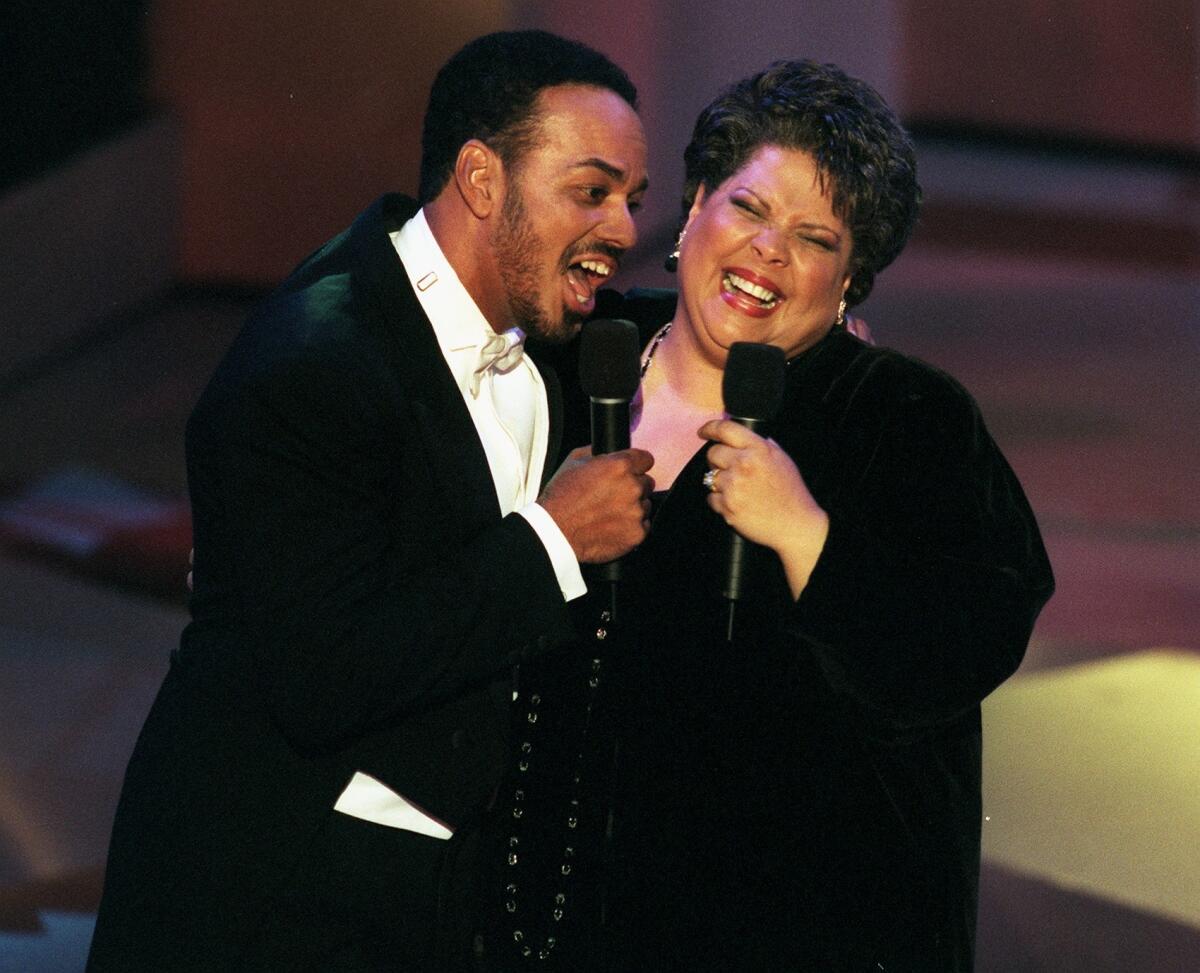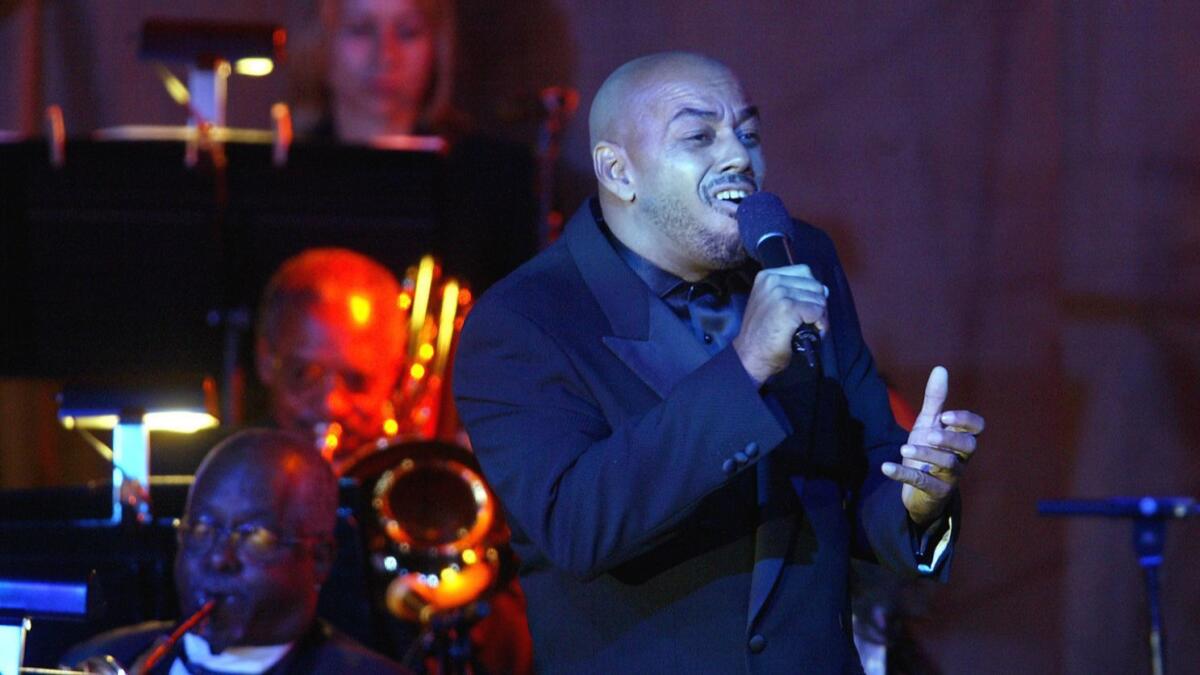James Ingram’s voice defined the grown-up romance of quiet storm R&B

- Share via
James Ingram was asked so many times about his big break that he developed a kind of shorthand for the tale of his being discovered by Quincy Jones.
An Ohio-born musician who’d moved to Los Angeles to make it in show business, Ingram was recording demos for a music publisher around 1980 when he cut “Just Once,” a tender romantic ballad written by Barry Mann and Cynthia Weil.
For the record:
1:25 p.m. Jan. 30, 2019An earlier version of this article said that Quincy Jones’ “The Dude” won three Grammy awards. The album won four Grammys.
“They got ‘Just Once’ to Quincy, peddling him the song, and he said, ‘Who was this singing?’ ” Ingram recounted for what had to have been the zillionth time in an appearance nearly a decade later on “The Byron Allen Show.”
“So he gave me a call, and here I am.”
The story might lack some connective detail. But it’s not hard to imagine a reaction as decisive as the one that led Jones to hire Ingram to sing on the producer’s 1981 album, “The Dude,” which went on to win four Grammy awards and launched Ingram toward a successful career of his own.
That’s how gripping Ingram’s voice was — a soft but sturdy baritone, muscular yet rounded at the edges, that quickly became one of the signature sounds of quiet storm R&B.
On Tuesday, Ingram’s friend the choreographer Debbie Allen wrote on Twitter that the singer, who was 66, had died; she didn’t specify when or by what cause, though TMZ reported that he’d had a form of brain cancer.
Word of Ingram’s death broke just days after the death of the composer Michel Legrand, who wrote one of his earliest hits, “How Do You Keep the Music Playing?,” which Ingram sang with Patti Austin in 1982.
The stately ballad — recorded, like many of Ingram’s tunes, for a movie (in this case the forgotten Burt Reynolds/Goldie Hawn comedy “Best Friends”) — demonstrates much of what made his music special: Set at a comfortable tempo, lush with strings and keys, “How Do You Keep the Music Playing?” depicts romance as a fundamentally grown-up experience; it’s a song about compromise, more or less, in which Ingram’s gently weathered vocals communicate the comforts as well as the frustrations of a committed relationship.

Yet as moving as I find this song, with an evolved idea of manliness that pop has unfortunately backtracked on since, “How Do You Keep the Music Playing?” is just one in a long line of similarly sensitive tunes that Ingram released throughout the ’80s. (For a sense of his competition at the time, consider that Ingram and Luther Vandross were both up for best new artist at the Grammys in 1982, an award that Sheena Easton somehow walked away with.)
Perhaps no soul singer of the era was more consistent than the guy who followed “Just Once” — so much for that title — with “Baby, Come to Me,” another plush duet with Austin; the pained “There’s No Easy Way” (“to break somebody’s heart,” the chorus continues); and “I Don’t Have the Heart,” which took the same sentiment to No. 1 on Billboard’s Hot 100 in 1990.
In each, Ingram sang about love not as fantasy but as lived reality — one reason perhaps that he was so sought after for collaborations with singers as varied as Kenny Rogers, Anita Baker, Michael McDonald, Barry White, Dolly Parton, Nancy Wilson and Linda Ronstadt.
Ingram’s creative partners could be sure he’d be listening to them rather than merely waiting to get his word in. But they also had to be prepared to match the emotional believability he brought to even “Somewhere Out There,” his and Ronstadt’s theme from the animated mouse movie “An American Tail.”
Which isn’t to say he was just a voice. On a 1986 episode of “American Bandstand,” Ingram proudly described himself as Jones’ protégé, and indeed he worked behind the scenes too, co-writing some of his best-known songs, including “Yah Mo B There,” and teaming with Jones to write “P.Y.T. (Pretty Young Thing)” for Michael Jackson.
Ingram also earned two Academy Award nominations for tunes he co-wrote with Carole Bayer Sager for the movies “Junior” and, uh, “Beethoven’s 2nd.” (See what I mean about taking his work seriously?)
Occasionally he broadened his thematic scope beyond romance, as when he covered Donny Hathaway’s “Someday We’ll All Be Free” in the late ’80s and when he and Allen addressed the aftermath of Hurricane Katrina in the title track they wrote together for Ingram’s most recent album, “Stand (In the Light),” which came out in 2008.
But it’s his remarkable love songs — as sophisticated as they were deeply felt — that we’ll remember.
Twitter: @mikaelwood
More to Read
The biggest entertainment stories
Get our big stories about Hollywood, film, television, music, arts, culture and more right in your inbox as soon as they publish.
You may occasionally receive promotional content from the Los Angeles Times.








